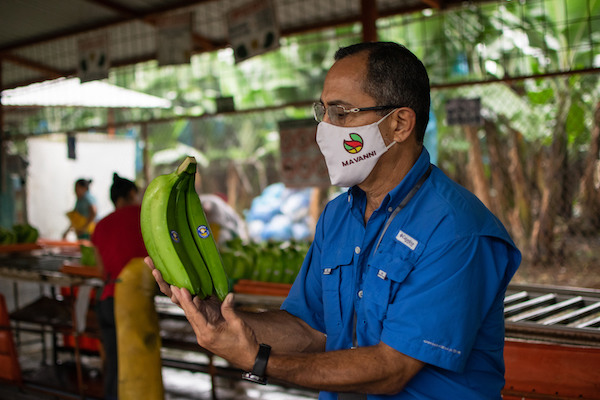Bananas are among Ecuador’s top five exports, and despite the challenges that the pandemic brought, the worldwide per capita consumption has continued to grow throughout last year. Banana company Mavanni exports to China, Slovenia, Chile and Greece and is run by César Padovani and Paola Matute. “We wanted to offer an export service with high knowledge of the market and strong technical support capable of contributing to the optimization of the supply chain,” Padovani shares.

César Padovani.
Ups and downs of 2020
The restrictions put in place across the world to prevent the spread of Covid have posed many challenges for the banana industry. “We had limited personnel for almost every step in the supply chain – from the cultivation process to transport logistics and fruit shipping. Added to that was the rapid and strong fall of the global economy due to blockades, delays in operations and partial or completely closures of consumption sources such as schools, stores, hotels, and more. There were also new and changing biosecurity measures put in place at a global level, as well as physical distancing and lockdowns which have not only caused great losses for the industry but have also affected the increase of operational costs,” Padovani explains.
All of these factors contributed to a low price for most of the year. “The spot prices in Ecuador were between 20-25% lower than the average of the last three years,” says Padovani. Then, the end of the year saw environmental effects that led to an increase in prices again. “The volcanic eruption in Ecuador impacted supplies and then Hurricanes Eta and Iota had a significant impact on the supplies coming out of Central America – specifically countries such as Guatemala, Honduras and Panama which contribute more than 75% to the total production of the region. This brought a noticeable improvement in spot prices in the last weeks of 2020, which we can still see today,” Padovani shares.
He adds: “Even though the uncertainty regarding demand persists, the available supply is lower than the average for this season, a trend that could continue. All these situations maintain at higher-than-expected price levels creating high expectations.”
2021: Uncertainty continues to be ahead
As the impacts of the climatic events such as the hurricanes will likely continue to be felt for a while longer, the road ahead for the banana industry is uncertain. “On the demand side there is also still a lot of uncertainty, and it can change due to a number of factors such as how quickly the vaccine will be distributed and how quickly the economy might recover,” Padovani says.
Padovani believes that the per capita consumption will continue to rise. “We project a sustained growth of 0.25 kg per capita because of the banana’s high nutritional contribution and health security versus its cost. Likewise, new markets such as those in the eastern zone will continue to grow,” he says. Despite this, the road ahead will not be simple. “The impact of the global economy is evident so work must be done to be incredibly competitive and create strategic alliances that combine resources and skills to be able to maintain this growth in an economic, socially and environmentally sustainable way,” Padovani says.
Mavanni: Focus on experience and support
Padovani chose Mavanni’s export markets after carrying out a market analysis considering consumption volume and expected quality in multiple regions. “The Asian market has had a high increase in its imports, going from 2.5 million in 2017 to 4.3 million in 2019. China represents 60% of this demand, and they imported 2.6 million tons of bananas in 2019,” Padovani explains. He continues: “The Middle East, Eastern Europe and Africa also register an increase in their imports. Ecuador’s imports to these destinations grew by 12%, 21% and 25%, respectively, during 2020.”
The bananas supplied by Mavanni are GlobalGAP, Grasp, Rainforest Alliance and organically certified. “We ensure supply chain sustainability and good environmental and social conditions, so we wanted to find markets where fruit like that is demanded. Our knowledge of different market demands, our technical experience, as well as the support that we provide throughout the entire process are variables that are highly valued by our clients as our business differentiator,” Padovani concludes.
For more information:
César Padovani Maridueña
Mavanni
Phone: +593 99 961 4694
Email: cpadovani@mavanniec.com
www.mavanniec.com
